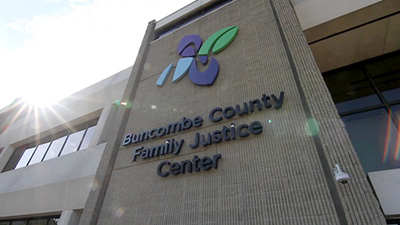This news item expired on Thursday, March 14, 2019 so the information below could be outdated or incorrect.

National Rankings Show Buncombe County is on Track to Become Healthiest Community in State
Addressing social factors, health disparities are critical for improving community health
Buncombe County is on track to become the third healthiest community in North Carolina, according to national County Health Rankings (CHR) released by the Robert Wood Johnson Foundation and the University of Wisconsin Population Health Institute earlier this month.
Excellent clinical care, a wealth of opportunities for physical activity, and educational achievement helped the county lead the way in North Carolina, ranking 14th in the state for overall health outcomes, an 11-point gain over last year, and 3rd overall in health factors that predict a community’s overall health moving forward.
Each year, the CHR offers a snapshot of how healthy communities are today and how healthy they are likely to be in the future by measuring a variety of factors known to impact health and quality of life, such as access to quality healthcare, behaviors like smoking and teen births, and social and environmental factors like education, employment, poverty, and pollution. Results are calculated for each county and compared within each state and against top-performing communities across the nation.
“What this data shows is that by addressing social determinants like housing, access to education, and employment opportunities, we lay the groundwork for better health to take root,” says BCHHS Health Division Director, Jan Shepard. “Our county’s strong partnerships and investments to prevent and reduce chronic diseases such as diabetes, infant mortality, domestic violence, the opioid epidemic, and trauma will continue to build greater resiliency and our community’s health over time.”
Buncombe County’s vast network of community partnerships like the Community Health Improvement Program and annual Community Health Needs Assessments have been a key driver in the county’s consistently high performance in the annual rankings. These population health frameworks provide a way to organize and measure community-wide efforts aimed at improving health.

The Buncombe County Family Justice Center (FJC) is an example of a community partnership that has been instrumental in The Rankings. The FJC was launched in July 2016 to provide coordinated services for victims of domestic violence and sexual assault from several partner agencies in one location. In the first year of services, 417 people accessed integrated intake services at the FJC. 92% of these survivors left with a plan to keep themselves safe and knew what to do if they were in danger. 71% of survivors surveyed reported decreased fear and anxiety. “The Family Justice Center is a great example of how co-locating services such as medical exams, legal assistance, childcare, and counseling can reduce trauma and speed up the healing process for our clients,” says Buncombe County Family Justice Center Coordinator, Julie Klipp Nicholson. “The agencies here at the FJC provide supports that build family well-being, all in one, safe place.”
In addition to rich community partnerships, Buncombe County also has a wealth of healthcare partners who are invested in caring for the whole person, helping to offset factors that may be making them less healthy.
“We have a wonderful Safety Net Coalition here in Buncombe County,” notes Jeff Heck, President and CEO of Mountain Area Health Education Center (MAHEC), a safety net member, primary care provider, and education center serving Buncombe and 15 other counties across Western North Carolina. “But it doesn’t matter how good our clinical care is if our community members can’t access it. That’s one reason we partnered with Pisgah Legal Services to ensure our patients can access the care they need.”
A Pisgah Legal Services staff attorney—an expert in poverty law, has worked on-site at MAHEC since fall 2017. This on-site attorney makes civil legal help accessible to low-income patients who need an advocate to stabilize their housing, prevent homelessness, stop domestic violence, or secure health insurance or other resources for themselves and their families. MAHEC’s partnership with Pisgah Legal Services helps their medical team and patients tackle problems of poverty that negatively impact health.
The YWCA’s MotherLove program to support teen mothers as they finish their education and Buncombe County’s Isaac Coleman and Tipping Point Investments continue to address health disparities and social determinants of health like access to fresh food, affordable housing, higher education, and living wage jobs.
A new initiative by the Asheville Buncombe Institute of Parity Achievement (ABIPA) ABIPA Cares Cooperative, is a recipient of the Isaac Coleman Community Investment Grants. This initiative seeks to build stronger pipelines for education and economic opportunity by developing a worker-owned co-op that addresses the social determinants of health, specifically around education and economics, by providing training opportunities that lead to living wage employment and entrepreneurship to build wealth among community members. These initiatives lift the efforts of individuals and neighborhoods as they develop essential community-based infrastructures for improved health and wellness outcomes.
For more information on the CHR and this year’s rankings, visit www.countyhealthrankings.org.